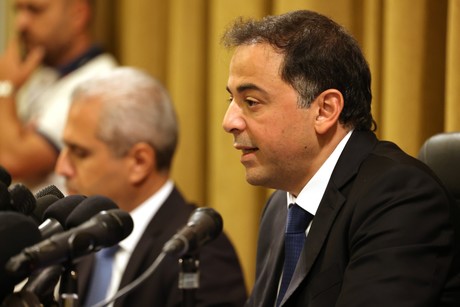Salameh's term ends, Mansouri takes up post

The central bank chief of crisis-torn Lebanon, Riad Salameh, who is wanted for alleged financial crimes in several European countries, handed over his post Monday with no designated successor in place.
First vice-governor Wassim Mansouri, who will temporarily take over, warned that "we are at a crossroad" and urged politicians to implement reforms demanded by the International Monetary Fund in return for a bail-out loan.
In a press conference Monday, Mansouri said the vice-governors had been against Salameh's decision to lend the government from the central bank reserves.
"There is no choice, if we continue previous policy ... the funds in the Central Bank will eventually dry up," Mansouri said.
"From now on, I will not sign on any expenditure for financing the government if it contravenes with my principles or the appropriate legal framework," the vice-governor added.
All four vice-governors earlier this month had threatened to resign but Mansouri announced Monday that he will take up the post.
He said previous policies that permitted the Central Bank to spend large sums on money to prop up the Lebanese state is no longer feasible. He cited years of spending billions of dollars to subsidize fuel, medicine, and wheat and more to keep the value of the Lebanese pound stable.
Instead, Mansouri proposed a six-month reform plan that included passing long awaited reforms such as capital controls, a bank restructuring law, and the 2023 state budget.
"The country cannot continue without passing these laws," Mansouri explained. "We don't have time, and we paid a heavy price that we cannot pay anymore."
The reforms Mansouri mentioned are among those the International Monetary Fund set as conditions on Lebanon in April 2022 for a bailout plan, though he did not mention the IMF. None have been passed.
The small Mediterranean country has been torn for the past four years by an economic crisis that the World Bank has labelled one of the worst in modern history.
- A new approach -
"This is the country's last chance," Manssouri said. "We can either stick to the old policies, and we have seen the result... or adopt a new approach and stop funding the state completely."
Reforms should be rolled out as part of a six-month "transitional plan", to be approved by parliament and the government, he said.
Mansouri urged parliament and the government to cooperate in order to legalize spending during this transitional period through a law issued in parliament.
"Parliament must pass a law allowing the central bank to lend the government on condition that government pay back the loans through a realistic plan," Mansouri said.
The central bank will also phase out the Sayrafa platform and float the exchange rate.
"Liberating and unifying the exchange rate means that the rate will be determined by the market forces of supply and demand without an interference from the central bank," Mansouri said.
- Judicial investigations -
As Salameh left his post, he remains subject of judicial investigations at home and abroad into allegations including embezzlement, money laundering, fraud and illicit enrichment, charges which he denies.
He is wanted in France and Germany, and Interpol has issued a Red Notice for his arrest, but Lebanon does not extradite its nationals.
Salameh is soon to be tried in Paris, a European diplomatic source told AFP.
In March 2022, France, Germany and Luxembourg seized assets worth 120 million euros ($135 million) in a move linked to a probe into Salameh's wealth.
In February, Lebanon also charged Salameh with embezzlement, money laundering and tax evasion as part of its own investigations.
The domestic probe was opened following a request for assistance from Switzerland's public prosecutor, who is looking into more than $300 million in fund movements by Salameh and his brother.
Defending his legacy, Salameh days ago told a local broadcaster that he had been made a "scapegoat" for the crisis, and blamed the rest of Lebanon's political class for abandoning him "a long time ago".
At the central bank headquarters, employees gathered to bid farewell to Salameh on Monday, to the sound of music and applause.
"The central bank has stood firm," Salameh told cheering employees in a video shared by local media. "During the crisis, it was a pillar that allowed Lebanon to carry on."
As one crook retires or meets their downfall, another quickly steps up to take their place, vying for control, power, and wealth. Each new player brings their unique set of skills, alliances, and ambitions, perpetuating a dangerous dance of deception...



